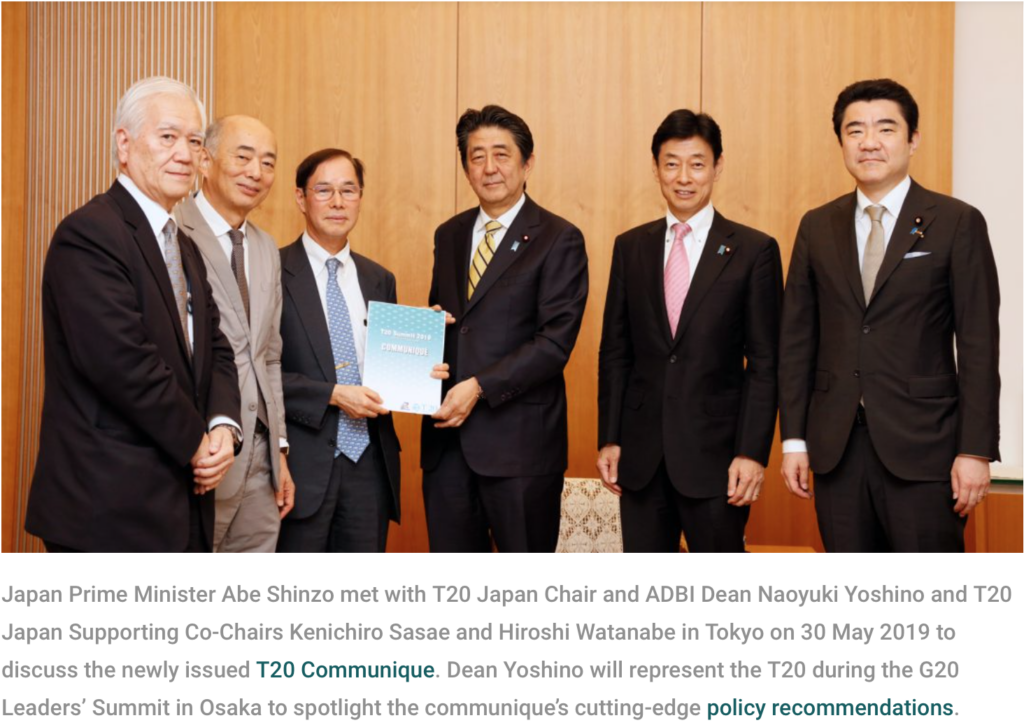Project Description
Under the 2019 Japanese Presidency of the G20, the Think 20 (T20) Engagement Group carried forward the work on women’s economic empowerment (WEE) through the Task Force on the 2030 Agenda for Sustainable Development. Once again, I had the privilege of serving as Co-Chair on women’s economic empowerment (SDG5) along with Gala Díaz Langou, Social Protection Program Director with the Center for the Implementation of Public Policies Promoting Equity and Growth (CIPPEC). We worked closely with the Women 20 (W20) Engagement Group under the leadership of Professor Yoriko Meguro and Haruno Yoshida.
The members of the 2019 working group represented various organizations including: Women’s Economic Imperative (WEI), Center for the Implementation of Public Policies Promoting Equity and Growth (CIPPEC), Data 2X – The United Nations Foundation, Dundalk Institute of Technology, DoubleX Economy, Fundación Salvadoreña para El Desarrollo Económico y Social (FUSADES), Korean Women’s Development Institute, Overseas Development Institute (ODI), International Center for Research on Women (ICRW), Newcastle University Business School, Sophia University, Sampark NGO & Trust, Women’s World Banking, and Women’s Enterprise Scotland (WES).
CONTEXT
The T20 gathering of the world’s leading Think Tanks aimed at driving policy innovation to help G20 Leaders address pressing global challenges and seek a sustainable, inclusive and resilient society. As noted by the T20 Chairs, “the Sustainable Development Goals aim to realize a society
Video Interview: Izumi Ohno, JICA
‘that leaves no one behind,’ and this shares much common ground with the concept of human security which Japan has been promoting for many years.”
In explaining the rationale for the Task Force on the 2030 Agenda for Sustainable Development, Lead Co-Chair Izumi Ohno identified six issues which are critically important for SDG advancement, including women’s economic empowerment.
Dr. Ohno emphasized that “the gender lens is critical … women account for an important share so the success of all SDGs critically depends on gender … gender goal SDG 5 cross cuts the other 16 goals.”
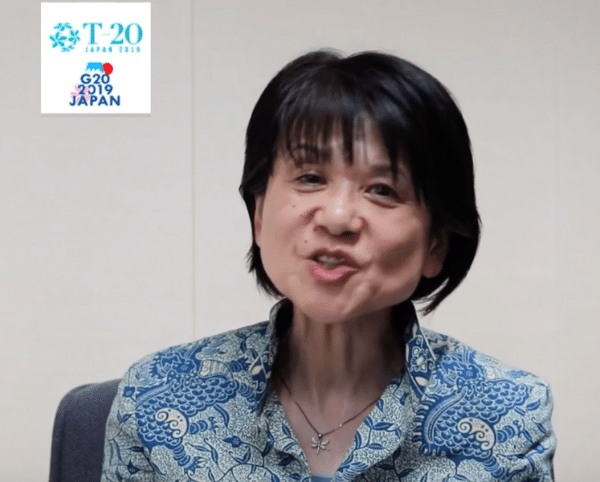
KEY EVENTS AND OUTPUTS
The following provides an overview of key T20 events and outputs under the Japanese presidency.
INCEPTION WORKSHOP: AGENDA SETTING
(Tokyo, Japan – December 2018)
As in 2018, the T20 agenda for women’s economic empowerment was defined in consultation with the W20 and was framed by the priorities of the W20: Labor equity; Financial equity; Digital equity; Governance. Members of the Civil Society Engagement Group (C20) also participated in our consultation with the W20 during the inception workshop. In addressing these priorities, the T20 Task Force on the 2030 Agenda for Sustainable Development sought to: support an integrated Women’s agenda; provide inputs for the W20 agenda; and produce robust recommendations to the G20. Accordingly, the Task Force committed to producing two policy briefs on: (1) the gendered perspective on changing demographics and (2) the measurement of WEE.
SUSTAINABLE DEVELOPMENT GOALS JOINT CONFERENCE
KDI School of Public Policy and Management & Japan International Cooperation Agency (Seoul, Republic of Korea – February, 2019)
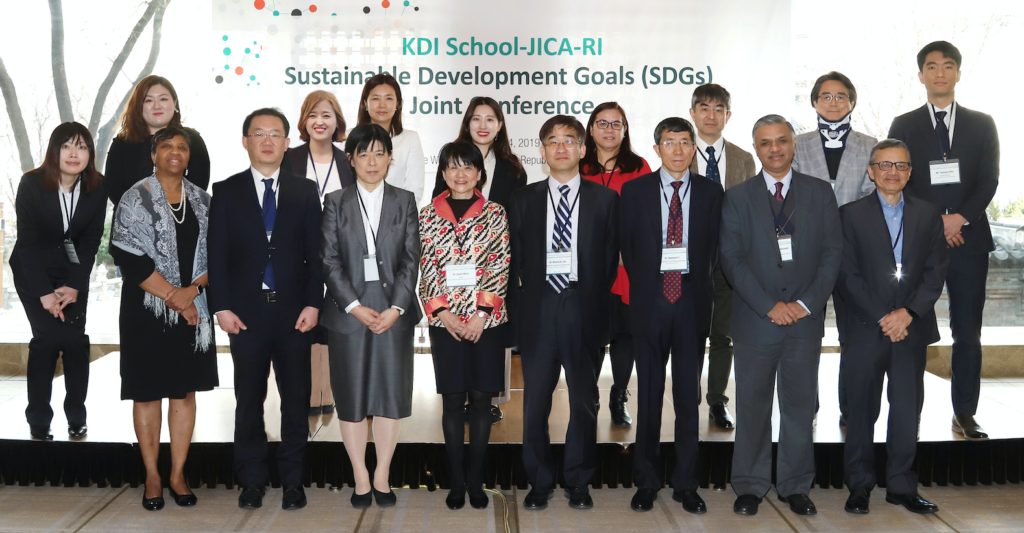
The goal of this conference was to discuss Asian perspectives to inform T20 policy recommendations in the areas of education, private sector, technology cooperation, and gender economic equity. In addition to selected Task Force members, participants of the conference included representatives and experts from government associated institutes and international organizations in Asia.
The panel discussion in the session on Gender and SDG Implementation focused on the regional challenges and lessons of experience in identifying and addressing the drivers of women’s economic empowerment and the implications for the achievement of the SDGs in the region. In addition to myself, panel members included: Eun Kyung Kim, Research Fellow of the Research Center for Gender Equality, Culture and Education, Korean Women’s Development Institute; and Mary Alice Rosero, Social Development Specialist, Asian Development Bank.
BERLIN GLOBAL SOLUTIONS SUMMIT – Gender Economic Equity for Inclusive Growth and Sustainable Development (Berlin, Germany – March, 2019)
The Kiel Institute’s Global Solutions Summit is an offshoot of the Global Solutions Initiative, brings together “thought leaders and decision-makers” to meet, discuss, and provide insight into policy reformations on issues raised by the G20. The overall theme of the Summit was highlighted by German Chancellor Angela Merkel during her keynote address. Chancellor Merkel emphasized the importance of multilateralism and international cooperation when it comes to tackling international financial stability and inclusive growth.
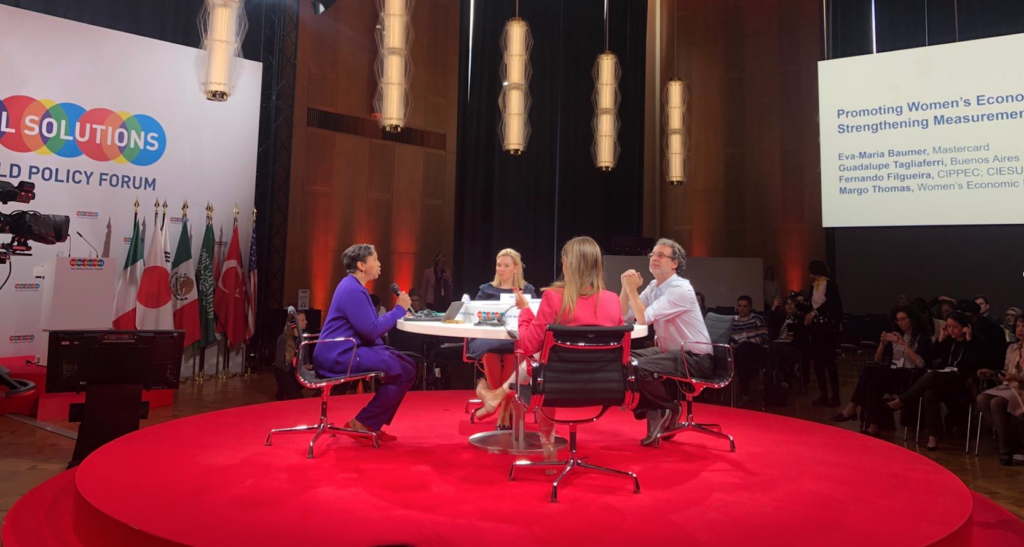
I moderated the session on “Promoting women’s economic empowerment; strengthening measurement to deepen impact.” United Nations’ Fellow, Mayra Buvinic gave the keynote address. Dr. Buvinic stressed the importance of nonlinear and cross-cultural approaches to women’s empowerment, with particular emphasis on methodologies of data collection that accurately reflect the shortcomings of gendered economic policy. Following the keynote, Gala Diaz Langou, CIPPEC Social Protection Program Director and my Co-chair on women’s economic empowerment – provided a summary of the 2019 policy briefs. The following panelists shared their perspectives and ongoing work on women’s economic empowerment issues:
- Eva-Maria Baumer, Vice President, Corporate Engagement, Office of the Vice Chairman,
Mastercard, Inc. - Guadalupe Tagliaferri, Minister of Human Development and Habitat, City of Buenos Aires, Argentina
- Fernando Filgueira, Centro de Implementación de Políticas Públicas para la Equidad y el Crecimiento (CIPPEC)
In keeping with the summit’s themes, the panel discussion emphasized the need for an inclusive approach that brings together governmental organizations, private corporations, civil society, and academia to collaborate on setting aggressive targets, taking decisive action, and producing impact.
T20 SUMMIT in Tokyo: Recommendations for Action on Women’s Economic Empowerment (May 2019)
The T20 Task Force on the 2030 Agenda for Sustainable Development added to the 2018 body of work on gender economic equity by producing two policy briefs covering the following topics:
- A Gendered Perspective on Changing Demographics: Implications for Labour, Financial and Digital Equity
- Women’s Economic Empowerment: Strengthening Public and Private Sector Impact through Accountability and Measurement
One of the hallmarks of the 2019 process was the coordination on the gender equality agenda across engagement groups. We applied a gendered perspective on key areas of focus within the SDG Task Force. Co-leads of the various topic areas were encouraged to review and provide inputs on draft policy briefs.
Under an initiative spearheaded by Civil20 and Labour20, we collaborated with Civil20, Labour20, Think20, Women20, and Youth20 to issue two statements urging the G20 to take action on gender equality. These statements ask the G20 Leaders to “put their words into action” by addressing violence and harassment in the world of work and eliminating gaps in labour market participation. As noted by Atsuko Miwa, Co-Chair of Civil20, “These joint statements send a clear cross-sector message to G20 that gender equality sits at the heart of sustainable economic development.”
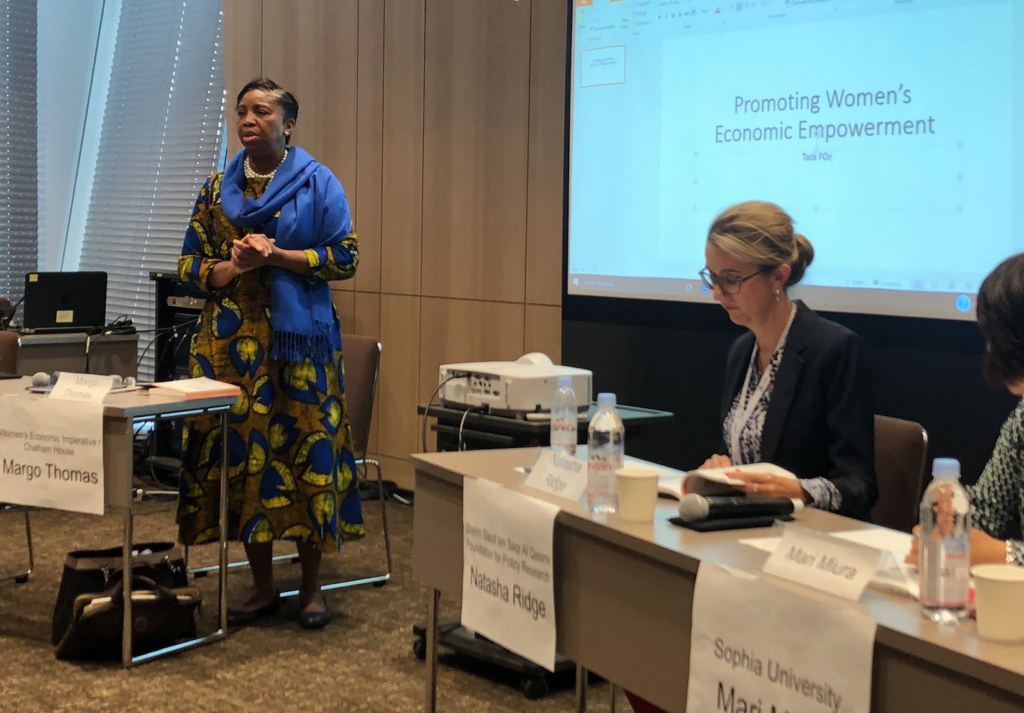
During the Summit, I moderated a robust discussion on women’s economic empowerment that included lively exchanges between the panel and attendees. The members of the panel shared their particular perspectives on the issues and challenges of women’s economic empowerment. The presentation on the City of Kitakyushu highlighted the role of women in driving policy changes to increase labour force participation and strengthen mechanisms for delivering care within the city. Presenters and discussants on the panel included:
- Professor Miura, W20 and Sophia University;
- Kanako Aramaki, Manager, Women’s Active Participation Support Office, City of Kitakyushu;
- Jose Florito, Social Protection Coordinator, CIPPEC; and
- Natasha Ridge, Executive Director, Ras Al Khaimah, UAE, and
lead author of the Policy Brief on Gender Equality in Education.
The Think 20 Communique was presented to the Minister of Foreign Affairs, Mr. Taro Kono, at the end of the Summit. In accepting the document, the Minister pledged to ensure that the recommendations in the communique are discussed during the Leaders’ Summit. The document was subsequently presented to Prime Minister Abe on May 31, 2019.
The T20 Communique’s action steps for promoting women’s economic empowerment included:
- Remove systemic legal and social barriers in the labor market that disproportionately limit women’s labor force participation and countries’ potential to deal with demographic transition, especially by adopting policies that recognize, reduce, redistribute and represent unpaid care and domestic work, and by presenting mid-term reports on the 2014 Brisbane commitment on “25 by 25.”
- Improve women’s economic empowerment data availability, analysis and quality in the public and private sectors, recognizing that data inputs are essential for quality policy design, benchmarking and measuring implementation and accountability progress.
- Mainstream gender in public policy making and require private and third sector entities to adopt and report on gender policies and outcomes.
As the G20 Heads of Government meet in Osaka, Japan in the coming weeks, we hope that the work and focus on gender economic equity will be reflected in the commitments to action and outcomes. In preparation for the Osaka Summit, the Japanese presidency has announced that women empowerment will be one of the eight main themes to be discussed. [Source: G20 Japan website] We hope that the Leaders will continue efforts to apply a gender lens to each area of discussion based on the recognition that women comprise half of the world’s population and play a critical role in the global economy. The goals of inclusive growth, peace, and security will not be achieved without women’s empowerment. The issue must not be siloed.
